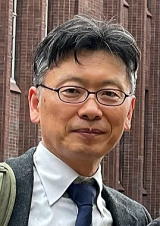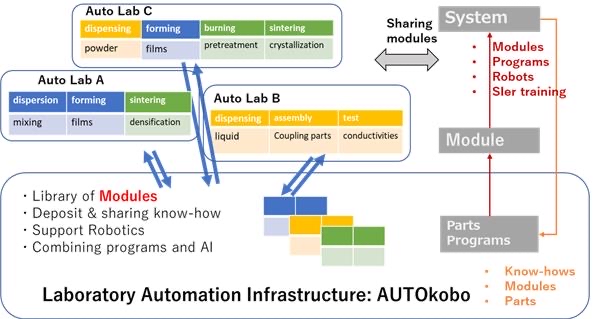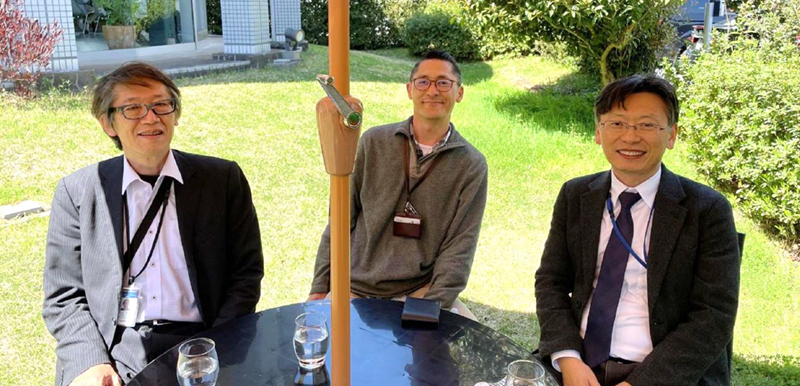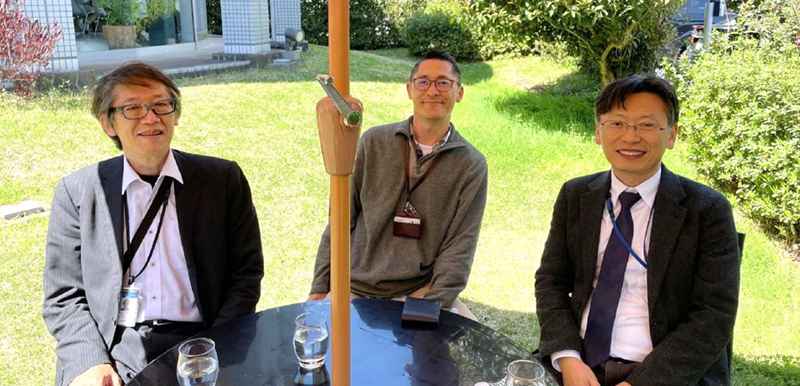About AUTOkobo
At AIST, we are actively contributing to the transformation of research through an internal initiative called “AUTO実験工房 (AUTOkobo),” an ecosystem designed to support research transformation (RX) by promoting laboratory automation and autonomous experimentation. This initiative aims to overcome key barriers to the widespread adoption of autonomous systems such as high equipment costs, the need for specialized expertise, and the lack of standardization in hardware and software. By developing a modular, reusable platform, the AUTOkobo enhances accessibility, reduces financial and technical risk, and fosters collaboration across diverse research domains.

Woosuck Shin AUTOkobo Leader
"Welcome to AUTOkobo. We create new value by developing low-cost modules that can be easily reconfigured and improved to lower the threshold for introducing autonomous experiments and deploying them horizontally. AUTOkobo is a partner for all researchers. "
Headquarters Functions
(2) WORKSHOP
(3) Information Sharing
(4) Education & Seminars
(1) Module Development & Lending
One of the core strategies for achieving low-cost and easily reconfigurable
experimental systems is the development of modular components-functional
experimental tools such as robot arms, dispensing units, and more. These
modules are made interoperable through the use of standardized interfaces,
enabling quick and flexible assembly into custom experimental setups.
Researchers borrow these modules to build their own automated workflows,
and once their experiments are complete, the modules are returned and reused.
This modular approach not only facilitates system modification but also
minimizes experimental waste through a lending and recycling system.

(2) WORKSHOP
The AUTOkobo workshop serves as the central headquarters for all operations.
In one aspect, it functions as a kind of “convenience store” of automation
accessories, allowing researchers to quickly “mock up” their intended experimental
systems.
In another aspect, it is the site for module development, as described
in the following section. Additionally, final adjustments to experimental
systems are carried out in this workshop before being transferred to the
researcher’s laboratory for use.

(3) Information Sharing
One of the primary efforts of the AUTOkobo is to serve as a central headquarters for automation support. To this end, significant effort is dedicated to the collection, organization, and storage of know-how, automation accessories, benchmarking data, and other related information. This information is maintained in an internal knowledge database, which is shared among AUTOkobo members.

(4) Education and Seminars
Another core goal the AUTOkobo is to lower the technical barriers to automation and autonomous experimentation through the development of targeted educational programs. These programs are offered in a variety of formats: hands-on training, lecture-based sessions, and small group workshops and cover a wide range of essential skills. Topics include Python programming, robotic risk assessment, robotic arm operation, 3D CAD design, 3D printing, and more.
By providing practical, accessible training opportunities, the AUTOkobo
aims to equip researchers, engineers, and students with the knowledge and
confidence needed to integrate automation into their own experimental workflows.
Through these efforts, we hope to foster a new generation of researchers
capable of designing and implementing flexible, efficient, and safe automated
systems tailored to their scientific goals.

Events
【FY2025】| 2025/11/10 | Seminar | Knowledge Graphs for Autonomous Experimentation in Material Science | Prof. Cogan Shimizu (Wright State University, USA) |
| 2025/10/10 | Plenary Meeting | The 15th AUTOkobo Plenary Meeting, Social Gathering |  |
| 2025/09/11 | Plenary Meeting | The 14th AUTOkobo Plenary Meeting | |
| 2025/08/21 | Meeting | Closed-Loop and NIMO Utilization Kick-off Meeting | |
| 2025/07/24 | Plenary Meeting | The 13th AUTOkobo Plenary Meeting, Social Gathering | |
| 2025/07/18 | Seminar | New Research Style Pioneered by Digitalization: Bringing Japan's Strength to the World | Prof. Taro Hitosugi (The University of Tokyo) |
| 2025/06/06 | Seminar | The Aim of Experiment Automation for Realizing Bio-DX | Dr. Takaaki Horinouchi (RIKEN) |
| 2025/05/20 | Educational Program Elementary 1) | Introduction to Python for Experiment Automation (Elementary 4-hour course) | |
| 2025/04/24 | Kick-off | The 12th AUTOkobo Plenary Session - R7 | |
| 2025/04/16 | Educational Program Intermediate 1) | Let's make use of 3DCAD in research activities! Manufacturing workshop with 3D printer - Let's learn to make jigs and experimental apparatuses by yourself! |
Project Members
(From right to left in the photo)- Project leader: Woosuck Shin
- Project manager: Don Futaba
- System Integration: Takaya Inoue

Themes
( shows Closed-loop system)
shows Closed-loop system)
.jpg)
Achievements(Papers, Awards, Press releases, etc.)
(2025)1. ”Self-driving laboratories in Japan”
N Yoshikawa, Y Asano, D.N. Futaba, K Harada, T Hitosugi, G.N. Kanda, S Matsuda, Y Nagata, K Nagato, M Naito, T Natsume, K Nishio, K Ono, H Ozaki, W Shin, J Shiomi, K Shizume, K Takahashi, S Takeda, I Takeuchi, R Tamura, K Tsuda and Y. Ushiku
Digital Discovery, 2025, 4, 1384.
Inquiry
Nanocarbon Material Research Institute
Address: AIST Tsukuba Central 5, 1-1-1 Higashi, Tsukuba, Ibaraki, 305-8565,
Japan
E-mail:sgt-info-ml*aist.go.jp (Please convert"*" to "@")
